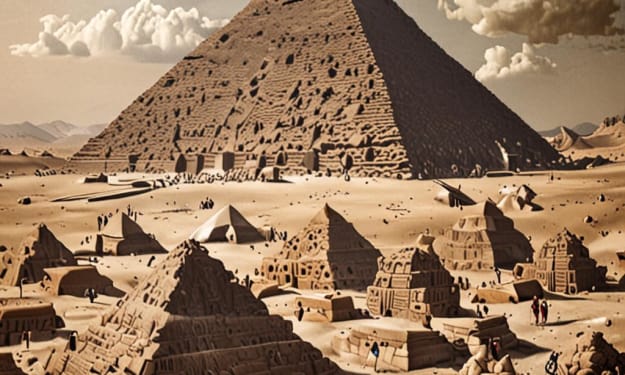The Plague of Civilization
Unveiling the Epidemics of Progress

Introduction
Civilization, with its sprawling cities, advanced technologies, and complex societies, stands as a testament to human ingenuity and ambition. However, the journey of civilization has been marred by numerous plagues—both literal and metaphorical—that have shaped the course of history. These plagues are not merely outbreaks of disease, but also social, economic, and environmental crises that have threatened to unravel the fabric of human societies. This article explores the multifaceted concept of the "plague of civilization," examining how various plagues have influenced and been influenced by the development of human civilization.
Chapter 1: The Biological Plagues
1.1 The Bubonic Plague
The Bubonic Plague, also known as the Black Death, is perhaps the most infamous of all plagues. Originating in the 14th century, it decimated the population of Europe, killing an estimated 25-30 million people. The disease was caused by the bacterium Yersinia pestis, transmitted through the fleas carried by rats.
Impact on Society:
Demographic Collapse: The massive loss of life led to a severe labor shortage, disrupting agriculture and industry.
Economic Shifts: The scarcity of workers led to higher wages, which in turn weakened the feudal system and contributed to the rise of a market economy.
Social Unrest: The widespread death and suffering led to social upheaval, with increased persecution of minority groups like Jews, who were often scapegoated for the plague.
1.2 Smallpox
Smallpox has a long history of afflicting human populations, with evidence of the disease dating back to ancient Egypt. The virus caused high fever and a distinctive skin rash, with a high mortality rate among those infected.
Impact on Civilization:
Colonial Expansion: Smallpox played a devastating role in the European colonization of the Americas, decimating indigenous populations who had no immunity to the disease. This facilitated European conquest and colonization.
Public Health Advancements: The development of the smallpox vaccine by Edward Jenner in the late 18th century was a landmark in medical history, leading to the eventual eradication of the disease in the 20th century.
Chapter 2: The Social and Economic Plagues
2.1 The Industrial Revolution
The Industrial Revolution marked a period of unprecedented technological advancement and economic growth. However, it also brought about significant social and environmental challenges.
Impact on Society:
Urbanization and Overcrowding: Rapid industrialization led to the growth of cities, which often resulted in overcrowded and unsanitary living conditions. These conditions were ripe for the spread of diseases like cholera and typhus.
Labor Exploitation: The demand for labor in factories led to the exploitation of workers, including women and children, who were subjected to long hours, low wages, and dangerous working conditions.
Environmental Degradation: Industrial activities led to significant environmental damage, including air and water pollution, which had long-term health impacts on urban populations.
2.2 Economic Inequality
Economic inequality is a persistent plague of modern civilization, characterized by a significant disparity in wealth and income between different segments of society.
Impact on Society:
Social Stratification: Economic inequality contributes to social stratification, creating distinct classes with vastly different access to resources and opportunities.
Political Instability: High levels of inequality can lead to social unrest and political instability, as marginalized groups demand fairer distribution of wealth and power.
Health Disparities: Economic inequality is closely linked to disparities in health outcomes, with poorer populations experiencing higher rates of disease and lower life expectancy.
Chapter 3: The Environmental Plagues
3.1 Climate Change
Climate change represents one of the most pressing environmental plagues of the modern era, driven by the increased concentration of greenhouse gases in the atmosphere due to human activities.
Impact on Civilization:
Extreme Weather Events: Climate change leads to more frequent and severe extreme weather events, such as hurricanes, floods, and droughts, which disrupt societies and economies.
Sea Level Rise: Rising sea levels threaten coastal communities and infrastructure, potentially displacing millions of people.
Biodiversity Loss: The changing climate is causing widespread disruption to ecosystems, leading to the loss of biodiversity and the extinction of species.
3.2 Resource Depletion
The overexploitation of natural resources is another major environmental plague, driven by the demands of a growing global population and industrial activities.
Impact on Civilization:
Water Scarcity: The overuse and pollution of freshwater resources have led to water scarcity in many parts of the world, affecting agriculture, industry, and human health.
Deforestation: The clearing of forests for agriculture, logging, and urban development contributes to habitat loss, climate change, and reduced air quality.
Mineral and Fossil Fuel Depletion: The extraction and consumption of non-renewable resources like minerals and fossil fuels have long-term economic and environmental consequences, including energy crises and environmental degradation.
Chapter 4: The Psychological and Cultural Plagues
4.1 Mental Health Crises
The pressures of modern civilization have contributed to a rising prevalence of mental health issues, including depression, anxiety, and stress-related disorders.
Impact on Society:
Workplace Stress: The demands of modern work environments, characterized by high expectations and job insecurity, contribute to significant stress and mental health problems among workers.
Social Isolation: Technological advancements and changes in social structures have led to increased feelings of isolation and loneliness, particularly in urban settings.
Stigma and Access to Care: Despite growing awareness, mental health issues are often stigmatized, and access to mental health care remains inadequate in many regions.
4.2 Cultural Homogenization
The spread of globalization and the dominance of certain cultures and languages have led to the erosion of cultural diversity, a phenomenon known as cultural homogenization.
Impact on Civilization:
Loss of Languages: Many indigenous and minority languages are at risk of extinction, leading to the loss of unique cultural identities and knowledge systems.
Cultural Imperialism: The global spread of Western culture and values can marginalize and suppress local traditions and customs, leading to cultural displacement and identity crises.
Resistance and Revival: In response to cultural homogenization, there are movements aimed at preserving and revitalizing endangered cultures and languages, highlighting the importance of cultural diversity.
Conclusion
The "plague of civilization" encompasses a broad array of challenges that have accompanied human progress. From the devastating biological plagues of the past to the social, economic, environmental, and psychological crises of the present, these plagues remind us of the complex and often contradictory nature of civilization. While human ingenuity has led to remarkable advancements, it has also created new vulnerabilities and exacerbated existing inequalities. Addressing these plagues requires a multifaceted approach, incorporating scientific innovation, social reforms, and a commitment to sustainable development. By learning from history and recognizing the interconnectedness of these challenges, we can strive to build a more resilient and equitable civilization for the future.
About the Creator
Alohan I Rowland
I am a very innovative and aspiring kind of human i love music and i do music i love life and i love the earth so much
I love reading and i love to know much
Enjoyed the story? Support the Creator.
Subscribe for free to receive all their stories in your feed. You could also pledge your support or give them a one-off tip, letting them know you appreciate their work.






Comments
There are no comments for this story
Be the first to respond and start the conversation.